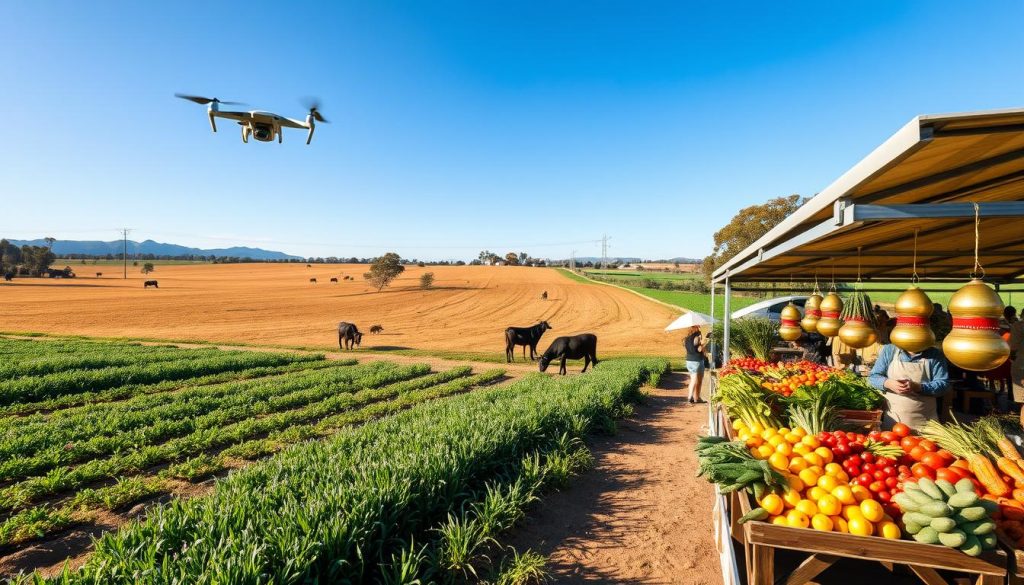Australia’s agribusiness sector is booming, drawing UK investors. The country’s varied climate and rich resources make it perfect for growing crops and raising livestock. New farming methods and tech are making it even better.
Government support and agri-tech advancements are key to this growth. They help farmers work smarter and more efficiently. This is great for the economy and for the environment.
As people around the world want better food, Australia’s role is crucial. UK investors can tap into this growing market. It’s a chance to make money and help the planet at the same time.
Understanding the Agribusiness Landscape in Australia
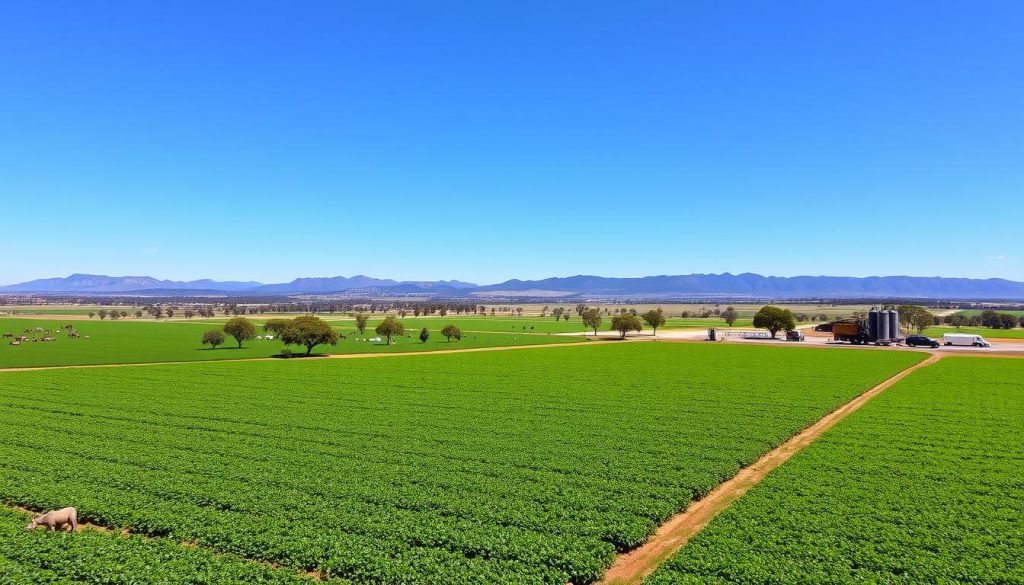
Australia’s agribusiness is diverse, thanks to its varied climate and geography. It plays a big role in the economy, making up a large part of exports. Activities like crop production, livestock farming, and fisheries meet both local and global needs.
The country has vast agricultural resources, including fertile land and plenty of water. But, it faces challenges like climate change, which affects production and resource availability. Australian farmers must innovate to stay competitive globally.
Investing in Australian agribusiness can be rewarding, thanks to its evolving farming practices and growing demand for sustainable methods. The sector’s complexities attract investors looking for both challenges and opportunities.
The Role of Technology in Agribusiness
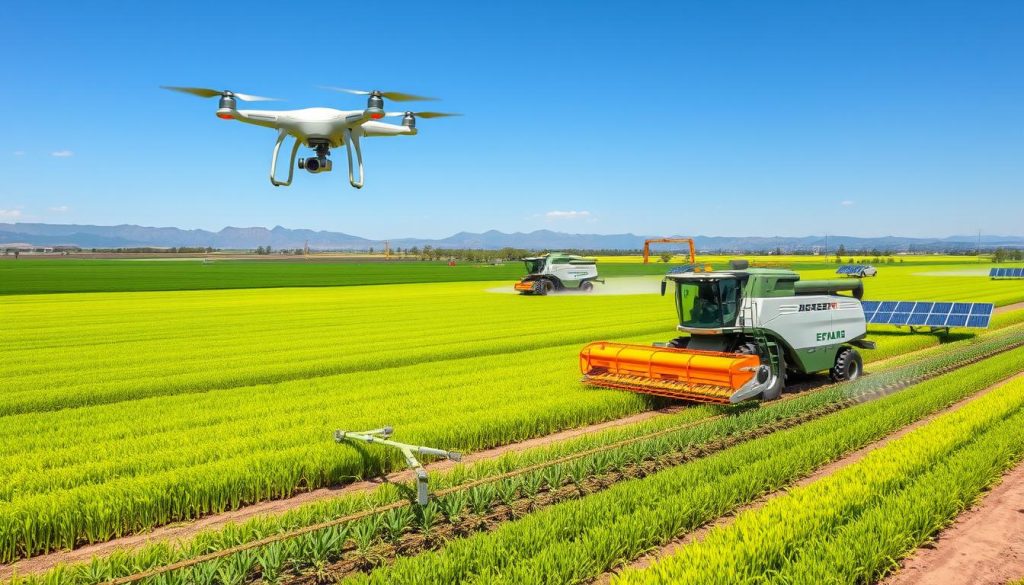
Technology is key in modernising agribusiness. It boosts crop production and supports sustainable farming. New tools and methods are making farming more efficient and productive.
Innovations Enhancing Crop Production
New tech has changed farming for the better. Some key advancements include:
- Drones for checking crop health and field conditions
- Satellite imaging for better irrigation and nutrient use
- Precision farming to cut waste and use resources wisely
These technologies help farmers make better choices. This leads to more crops and better care for the environment.
Agri-Tech Startups Leading the Way
Agri-tech startups are showing the sector’s innovative side. Companies like The Yield and AgriWebb are leading with new solutions. They show how tech can change farming, making it more competitive and growing.
Agribusiness Opportunities in Australia
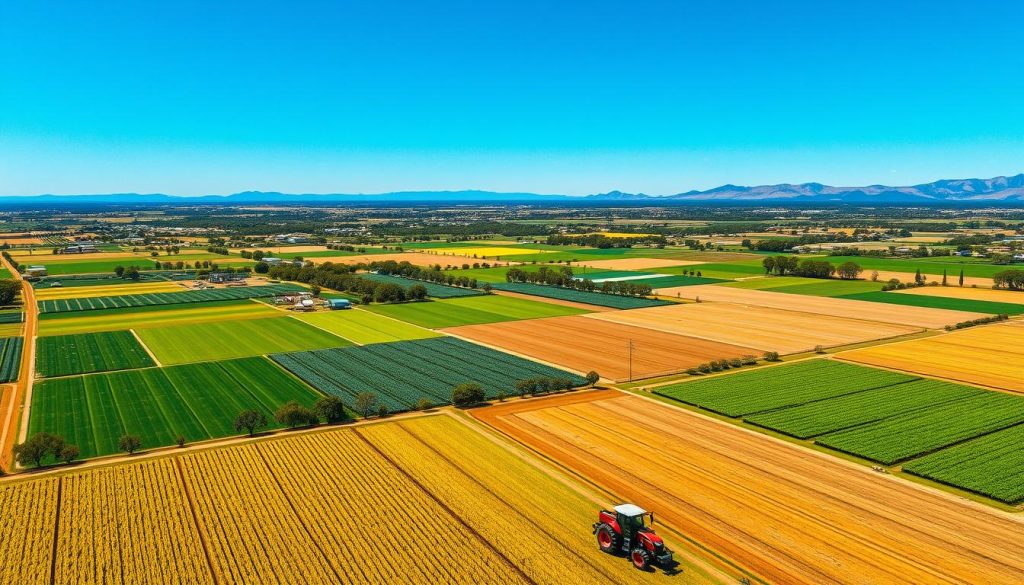
Australia is full of chances for agribusiness, especially for those looking to invest. The country’s rich land and growing demand for food make it a great place to invest. Key areas to look at include:
- Organic Farming: The move towards organic food is growing, offering good returns.
- Sustainable Farming Practices: With more focus on the environment, sustainable farming is becoming more popular.
- Health Foods: The market for healthy foods like superfoods is getting bigger fast.
- Wine Production: Australia is famous for its top-quality wines, offering many investment chances in vineyards and wineries.
The push for clean and green food is getting stronger, making Australia a more attractive investment spot. Looking into these areas can be a smart way to get into the agribusiness world.
Investment Trends in the Australian Agribusiness Sector
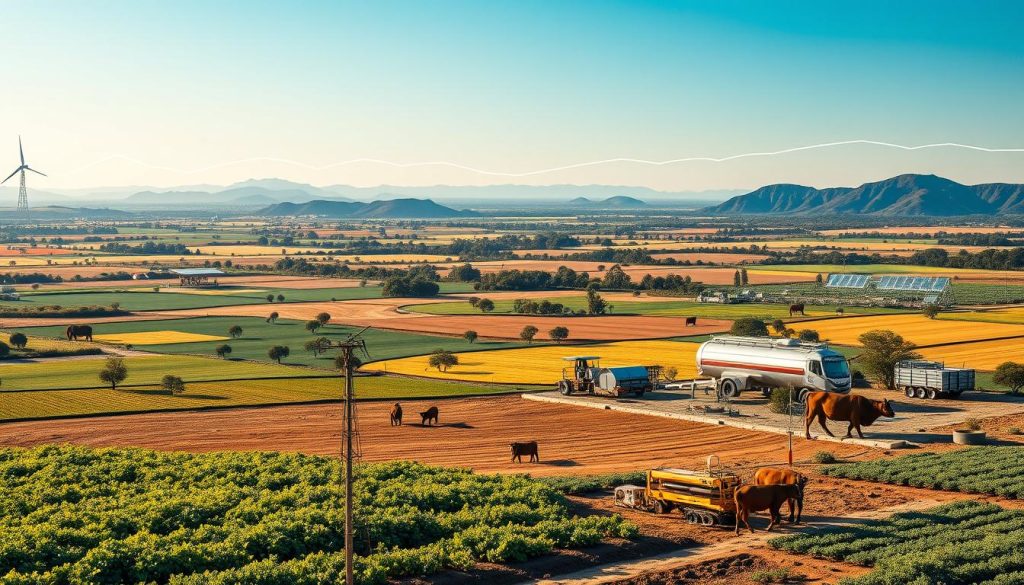
The Australian agribusiness sector is attracting a lot of interest from investors. This is because of its stable market and growth potential. Investors are now focusing more on horticulture, aquaculture, and grain production. These areas are in high demand and offer promising returns.
Key Sectors Attracting Investors
Investment in agribusiness is now concentrated on a few key sectors:
- Horticulture: This sector is booming, thanks to the growing demand for fresh produce at home and abroad.
- Aquaculture: With more people eating seafood, aquaculture is seen as a sustainable investment.
- Grain Production: Grain farming is still a major focus, thanks to ongoing improvements in efficiency and productivity.
Government Incentives for Agribusiness
The Australian government is supporting agribusiness with various incentives. These are designed to boost agriculture investment. Some of the main incentives include:
- Grants: Financial help for projects that bring new technology to farming.
- Subsidies: Support to reduce costs for farmers, making investment easier.
- Tax Concessions: Tax breaks to encourage more investment in agribusiness, helping it grow.
Challenges Faced by Agribusiness Investors

Agribusiness investors face many challenges that can affect their success. One big issue is dealing with complex regulatory rules. It’s crucial to know both local and federal laws to keep operations legal. Not following these rules can cause big problems and stop operations.
Understanding Regulatory Obligations
Following regulations is key to keeping operations ethical and getting into markets. Investors need to learn about laws on food safety, protecting the environment, and labour. Each area has its own rules, making it harder to follow them all. Keeping up with these rules helps avoid trouble with authorities and keeps operations running smoothly.
Market Fluctuations and Risk Management
Market risks are another big worry for agribusiness investors. Prices for goods can change for many reasons, like global trade, what people want, and the economy. To protect investments, strong risk management plans are needed. Using strategies like hedging can reduce losses when prices go up and down. Planning well and staying ahead of changes is key to overcoming these challenges.
Sustainable Practices in Australian Agriculture

Sustainable agriculture is key in Australian agribusiness, focusing on caring for the environment. As global environmental issues grow, using these methods is crucial. This section looks at why caring for the environment matters and shows successful examples in Australia.
The Importance of Environmental Stewardship
Environmental stewardship means managing natural resources wisely, protecting them for the future. In Australian farming, this approach helps keep biodiversity and makes farming systems stronger. Important parts of good stewardship include:
- Reducing soil damage
- Improving water quality and availability
- Lessening climate change effects
These actions help keep the environment balanced and support sustainable farming. Focusing on environmental care also meets consumer needs, making farms more competitive and sustainable.
Examples of Successful Sustainable Initiatives
In Australia, many farms show how to farm sustainably. Some examples are:
- Regenerative Farming: This method improves soil health with crop rotation and cover crops. It makes soil more fertile and cuts down on chemical use.
- Water Conservation Techniques: Using drip irrigation and rainwater harvesting saves water. This is vital in Australia’s dry climate.
- Integrated Pest Management: This method uses natural controls and monitoring to manage pests. It reduces harm to the environment.
These sustainable practices meet changing consumer needs and boost the Australian farming sector’s strength and profit.
The Impact of Global Trade on Agribusiness

Global trade has a big impact on Australian agribusiness. It shapes the sector’s growth and expansion. International markets are key for agribusiness exports, helping farmers and producers grow their profits.
Australia’s trade partnerships are crucial for navigating global trade. These partnerships open up new markets and improve access. But, they also bring challenges like trade tariffs and competition from other countries.
Several factors influence the impact of global trade:
- Changes in consumer preferences worldwide, driving demand for specific agricultural products.
- Technological advancements that enhance productivity and efficiency in meeting international market standards.
- Trade agreements that create a more favourable environment for agribusiness exports.
It’s vital to understand these dynamics for agribusinesses and investors. Success in the international market depends on being adaptable and aware of new trends. These trends can change the agribusiness landscape.
Future Trends Shaping Australian Agribusiness
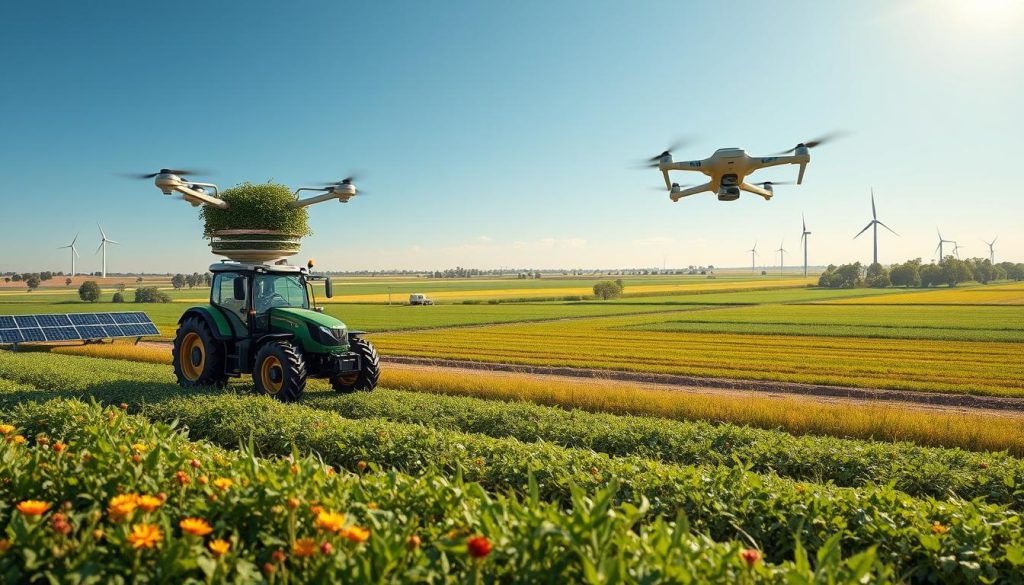
The Australian agribusiness sector is changing fast. New markets and changing tastes are key drivers. These changes include more demand for quality food, especially in Asia. This opens up new chances for Australian farmers and businesses to meet the needs of a more picky market.
Emerging Markets and Demand Drivers
Asia is a major force in this change, with a growing population and more money to spend. People are now looking for healthier food options. This demand is driven by several factors:
- More people living in cities want easy food choices.
- There’s a growing interest in sustainable and organic farming.
- Local food and farm-to-table ideas are becoming popular.
Predicted Market Changes Over the Next Decade
Looking to the future, digital farming will play a big role in improving how we farm. Technologies like precision farming and data analysis will make farming more efficient. Climate change also means we need new ways to keep crops healthy and productive. Some expected changes are:
- More use of automated farming tools.
- A move towards farming that improves soil health.
- More focus on where food comes from and how safe it is.
Profiles of Successful Agribusinesses in Australia
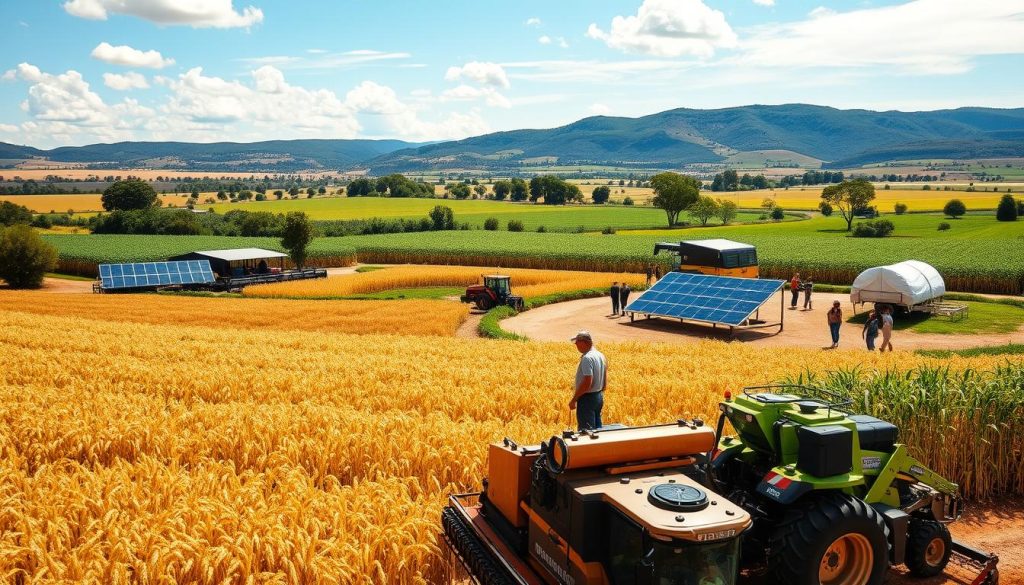
Looking at successful agribusinesses in Australia gives us great insights. We learn from their strategies and practices. These stories help new investors understand the sector better.
Case studies show how some companies have grown and stayed strong. They faced challenges but kept moving forward.
Case Studies of Notable Successes
The Australian Agricultural Company is a top example in cattle production. They use new tech and sustainable methods to improve. This shows how important innovation and care for the environment are.
Costa Group is another success story in horticulture. They’ve grown by changing their products to meet customer needs. This shows how important it is to listen to what people want.
Lessons Learned from Industry Leaders
Leaders in the field share important lessons. They say being green is key for lasting success. It’s vital to care for the environment.
They also stress the value of strong networks. Working together helps bring new ideas and keeps businesses strong. Lastly, keeping up with market trends is essential to stay ahead.
Networking and Partnerships in Agribusiness
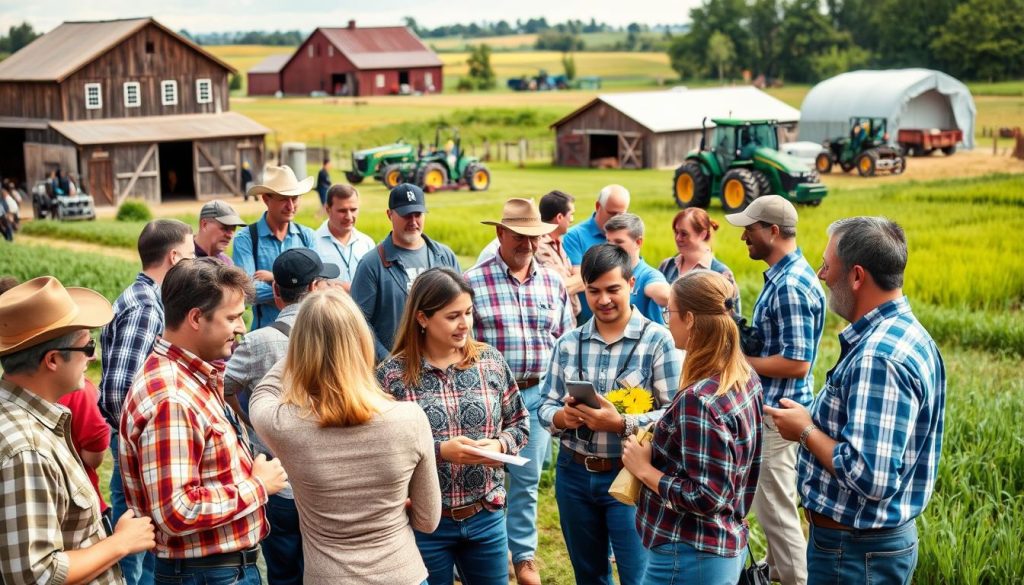
Connecting in the agribusiness world is key for growth. Good networking helps build strong partnerships. It also opens up chances to share knowledge and resources. Being part of industry groups and chambers of commerce is crucial for success.
Building Effective Business Relationships
To do well in agribusiness, focus on building strong relationships. This means:
- Going to industry events for networking and learning.
- Joining groups that connect you with important people in the field.
- Using social media to meet others in your field.
- Working on projects with others to share skills and resources.
These steps help businesses grow and innovate together. Good relationships in agribusiness lead to lasting partnerships. These partnerships are vital for long-term success.
The Importance of Research and Development
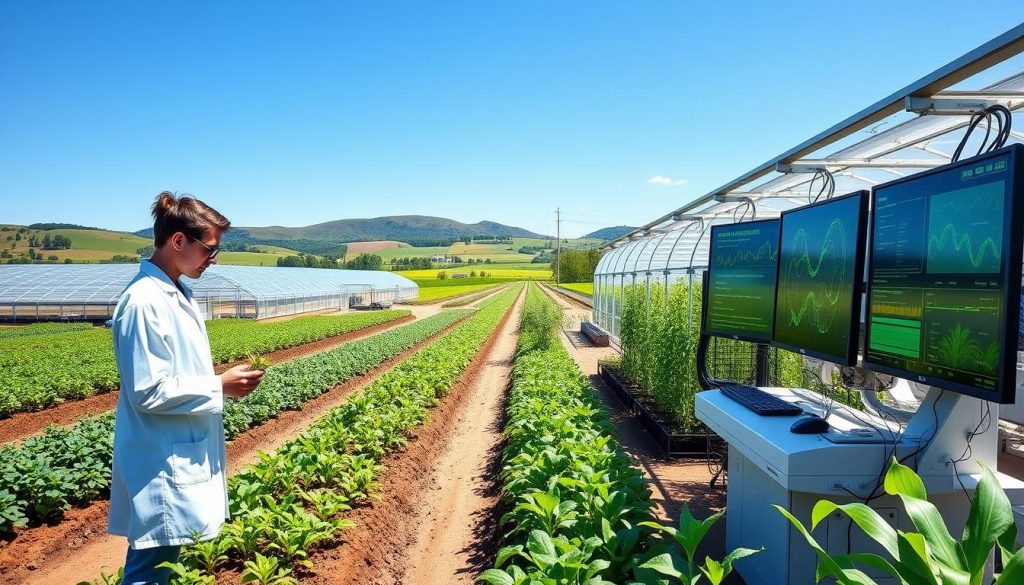
Research and development are key in the agribusiness world. They help farmers and businesses grow by introducing new ways to work. This leads to better yields, more sustainable farming, and higher quality products.
For long-term success, new technologies and methods are crucial. This is what makes R&D so vital.
Investment in Innovation for Long-term Growth
Innovation is vital for the agricultural industry’s success. By focusing on R&D, companies can create solutions for changing needs and environmental issues. This makes the sector more resilient and profitable over time.
Collaborations Between Research Institutions and Agribusiness
Working together with research groups like CSIRO is crucial for progress. These partnerships help share knowledge and apply new research to real-world problems. They work on improving crop management, pest control, and soil health.
Potential Risks and How to Mitigate Them

Investing in agribusiness comes with its own set of risks. Economic ups and downs, climate issues, and changing consumer tastes can affect your returns. It’s key for investors to understand these risks to succeed in this field.
To protect your investments, using effective risk strategies is vital. Here are some ways to do it:
- Diversification: Spread your investments across different areas of agribusiness to lessen the impact of one risk.
- Insurance Mechanisms: Look into comprehensive insurance to guard against unexpected events like natural disasters.
- Flexible Business Plans: Create business strategies that can adapt quickly to market changes and consumer needs.
By spotting and tackling potential risks, you can make your agribusiness venture more resilient. With strong risk mitigation strategies, you can build a profitable and sustainable business in this changing sector.
Education and Training in Agribusiness

The agribusiness sector needs a skilled workforce. Educational frameworks are key in shaping the industry’s future. Places like agricultural colleges and vocational centres offer training programs.
These programs cover important topics like sustainable farming and new technologies. They help graduates face today’s agribusiness challenges.
Examples of effective educational initiatives include:
- Apprenticeships that blend practical experience with classroom learning.
- Online courses that offer flexibility for working individuals looking to enhance their expertise.
- Workshops and seminars conducted by industry leaders, providing insights into real-world applications.
Investing in agricultural education boosts individual careers and the sector’s growth. By focusing on skills development, agribusiness can thrive. This empowers both current and future professionals to make a difference.
Engaging with Local Communities
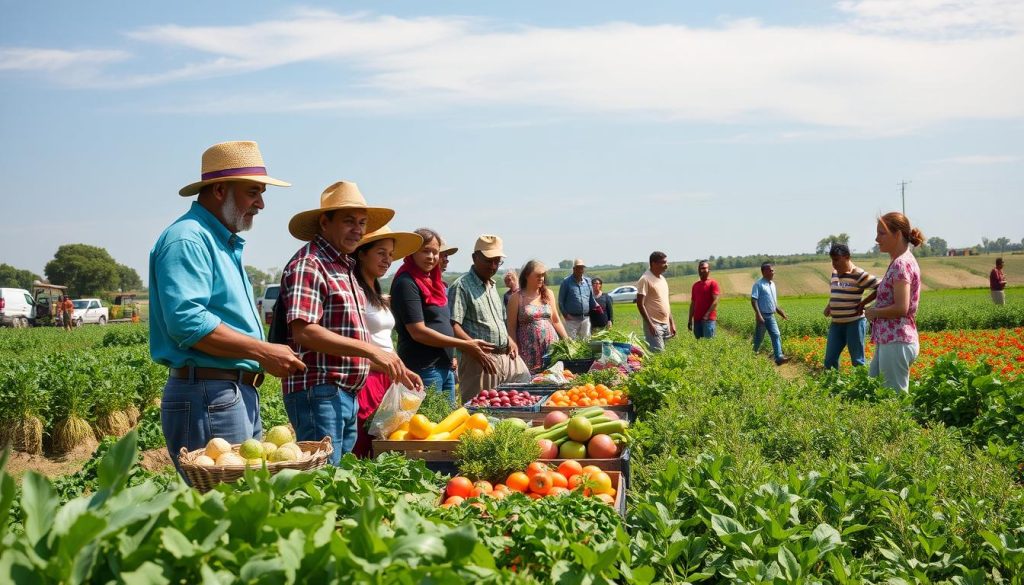
Working with local communities is key for agribusiness success. It builds trust and boosts sustainability. By engaging with locals, businesses gain a lot, and so do the communities.
Sharing knowledge and resources leads to a win-win situation. This approach creates a strong bond between the business and the community.
Building Trust and Sustainability
Trust starts with being open and ethical. People respect businesses that care about local values. To build trust, agribusinesses can:
- Attend community meetings and events.
- Work with local groups and charities.
- Support community projects and initiatives.
The Benefits of Community Involvement
Being part of the community brings many benefits. Agribusinesses see:
- Increased loyalty from community members.
- Valuable local insights for better decisions.
- Help navigating local rules and regulations.
Conclusion: The Future of Agribusiness in Australia
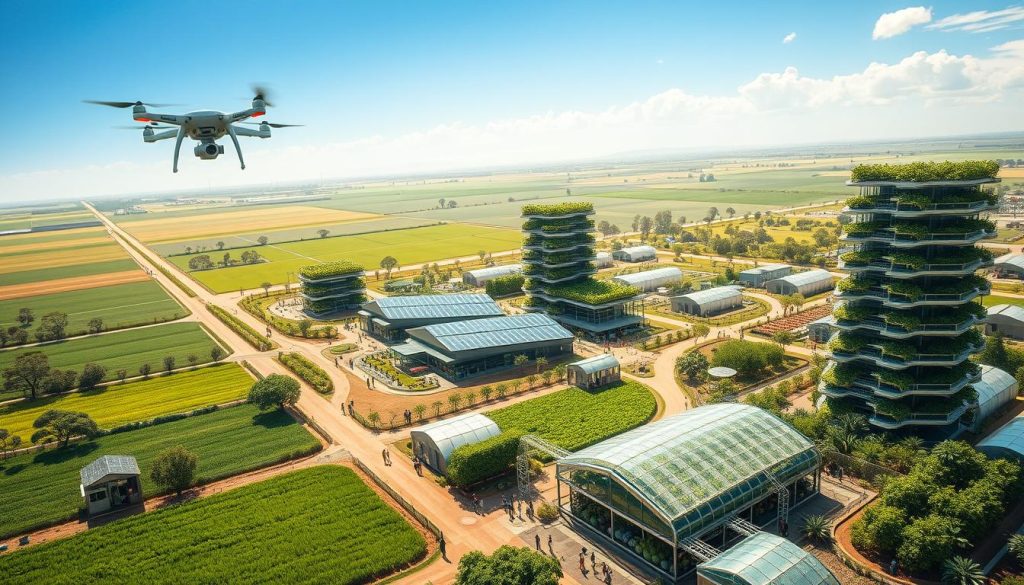
The future of agribusiness in Australia is full of chances and new ideas. The sector is getting better with new tech and green practices. Investors from the UK can find lots of chances in this lively market.
Planning carefully is key to tackling challenges and making the most of growth. Using modern tech and caring for the environment shows Australia’s agribusiness is serious about doing well. It wants to be productive and protect nature too.
In short, Australia’s agribusiness has a forward-thinking plan. This plan helps it stay strong and successful, making it a great place to invest. Keeping up with changes is important to fully benefit from this growing field.
Resources for UK Investors in Agribusiness
UK investors eyeing the agribusiness sector in Australia have many resources at their disposal. Government sites, like the Australian Trade and Investment Commission, offer detailed info on investment chances and rules. These platforms are key, helping foreign investors navigate the Australian market and spot investment hotspots.
Trade groups, such as the National Farmers’ Federation and the Australian Food and Grocery Council, shed light on the agribusiness scene. They provide vital tools, like market reports and networking chances. These help UK investors connect and keep up with trends, crucial for grasping local practices and boosting investment success.
Investment guides and reports from IBISWorld also play a big role. They give UK investors in Australia the tools to make smart choices. By using these resources, investors can align their strategies with the agribusiness sector’s potential, ensuring a lasting presence in a vibrant agricultural world.

